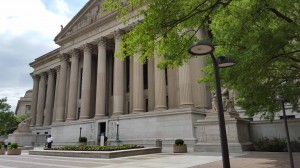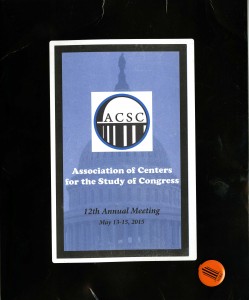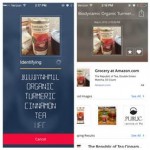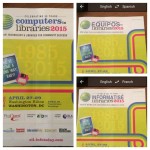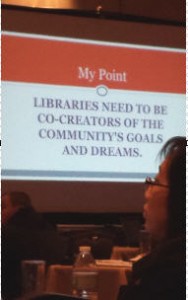Archives & Special Collections is a founding member of the Association of Centers for the Study of Congress, an organization which encourages the preservation of material that documents the work of Congress, including the papers of representatives and senators, and supports programs that make those materials available for educational and research use. Last week I attended the 12th annual meeting of ACSC, hosted by the National Archives and Records Administration’s Center for Legislative Archives located in Washington, D.C.
Over the years I have been representing UConn in this organization, I have taken the opportunity of the location to meet with the staff of Connecticut’s Congressional delegation and this year was no exception. On May 12th, I met with the Chief/Deputy Chief of Staff for Representatives Larson and Esty and Senators Murphy and Blumenthal to remind them that UConn would be interested in being identified as a repository for their papers and to answer any questions they may have regarding congressional research collections or Archives & Special Collections at UConn. Having already spoken with representatives of Rosa DeLauro and Joe Courtney earlier in the year, I hope to hear from all of them when the time comes for the records to find a permanent home!
The conference itself is a great opportunity to meet with colleagues from repositories with similar collecting interests and to learn what is happening in the wider world of documenting Congress, as well as hear from scholars and former members about their concerns, interests and activities associated with congressional papers. Sessions throughout the remainder of the week touched on think tanks, instruction support tools for the Bill of Rights, financial and friend support, women in Congress in the 1980s, electronic records and current research, and oral histories with a focus on the Voting Rights Act. Rounding out the two and half day conference was a presentation by a small group of ACSC members who have begun a collaborative online exhibition, an online Omeka instance hosted by the University of Delaware, that shares items from a variety of institutions illustrating issues associated with the 89th Congress (1965-1966). Definitely a project to which UConn will be contributing! It was also a pleasant surprise to have our own Barbara Kennelly, who served in Congress for 17 years representing the 1st District, speaking as part of the women in Congress presentation. This annual conference is always informative and sends one home bursting with ideas and plans…but having been away from the office for a week, I have some catching up to do first.
For more information about
The Association of Centers for the Study of Congress
The political collections in Archives & Special Collections
The Great Society Congress online exhibition
Congress creates the Bill of Rights information (app/ebook/pdf)
Barbara Kennelly Papers
Senate Oral histories

